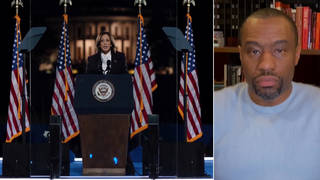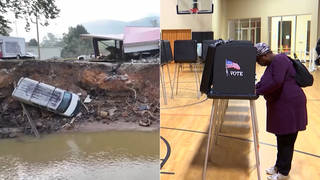
Related
Guests
- Bill Quigleylaw professor at Loyola University in New Orleans, also the director of the Law Clinic and Gillis Long Poverty Law Center at Loyola University.
As people around the world continue to protest the soaring prices of basic food items, the World Food Program has described the crisis as a silent tsunami. The head of the Food and Agriculture Organization blamed the current global food crisis on “inappropriate” policy decisions over the past two decades. Nowhere is this more clear than in Haiti, where hungry people are rioting in the streets because they cannot afford to buy rice. Haiti imports most of its rice from the United States, which in turn remains heavily subsidized. We speak with human rights lawyer, Bill Quigley. [includes rush transcript]
Transcript
JUAN GONZALEZ: As people around the world continue to protest the soaring prices of basic food items, the World Food Program has described the crisis as a silent tsunami. The head of the Food and Agriculture Organization, Jacques Diouf, blamed the current global food crisis on “inappropriate” policy decisions over the past two decades. He said Wednesday that while investment in agriculture has been sharply reduced in poor countries, wealthy countries have maintained generous farm subsidies. An official from the UN Conference on Trade and Development, Rolf Traeger, faulted the Structural Adjustment Programs prescribed by the International Monetary Fund and the World Bank for gutting agricultural production in the developing world.
AMY GOODMAN: Nowhere is this perhaps more clear than in the case of Haiti. Thirty years ago, Haiti had all the rice it needed. Then in 1986, Haiti turned to the IMF for a loan. Now, after cutting tariff protections on local rice, Haiti imports most of its rice from the United States, which in turn remains heavily subsidized. US rice farmers get one billion dollars a year in government subsidies. Meanwhile in Haiti, hungry people are rioting in the streets because they cannot afford to buy rice.
Bill Quigley is a human rights lawyer and law professor at Loyola University in New Orleans. His latest article is about the situation in Haiti. It’s called “The US Role in Haiti’s Food Riots.” Bill Quigley joins us now from the PBS station in New Orleans, WLAE. Welcome to Democracy Now!, Bill.
BILL QUIGLEY: Good morning and thank you.
AMY GOODMAN: Can you explain what’s happening in Haiti?
BILL QUIGLEY: Well, you know, I have many friends, like all of us do, who are just appalled by the pictures that they’re seeing and the stories that they’re hearing about hunger and that. And folks have asked me, you know, “What can I do to, you know, help some of these hungry people?” And in looking at it, it was clear that there is tremendous hunger.
I talked with a young male, eleven-year-old boy, Emmanuel, yesterday in Haiti, and he had not eaten since Sunday. So they’re — and he’s one of — he lives in Cite Soleil. I talked to some other families around the city, and they — either if they’re lucky enough to live near a church or something like that that has a feeding program, then they get to eat, but there’s many places in the city of Port-au-Prince and around the country where they don’t have that.
The problem really is, is that the United States and the International Monetary Fund and the World Bank, all of which we, the United States, dominate, have for the last twenty-five, thirty years have insisted that in order to get the loans, which Haiti and these other countries, agricultural countries, need, in order to get those loans, Haiti had to change their economic system so that their country was open to competition from other countries on agriculture, trade, a number of other things.
It’s so clear in the case of rice. As you said, thirty years ago, Haiti imported almost no rice, was an exporter of sugar and other things. Today, Haiti imports nearly all of its rice. It even imports sugar, even though it was the sugar-growing capital of the Caribbean. And the reason is, is that the powers that be said, in order to get these loans, which they need desperately to be able to survive, that they had to open up their markets to competition.
Well, it turns out that the competition doesn’t do the same thing. And the main competition is the United States. So at this point, the United States exports over 200 million metric tons of rice every year to Haiti. And they’re actually like our third biggest customer. And the reason is that our rice is cheaper than the rice that they could grow there themselves, because our rice is so heavily subsidized. A billion dollars a year of taxpayer money goes to rice farmers in the United States, plus we have a tariff. We have three different subsidies, three different programs that do that, plus we have a tariff that adds between three and 24 percent protection for our rice farmers. And as a result, the rich and powerful country of the United States, along with other rich and powerful countries in the world, have just really bullied these small countries into accepting our rice. And as the rice from the United States came in — they even called it “Miami rice” and some call it the invasion of Miami rice — that the rice flooded in at low or below cost — free or below cost and destroyed the ability of farmers in Haiti to be able to grow rice. And as a consequence, the country now depends totally on imported rice. Cost of import — cost of rice around the world has gone up over 100 percent since January.
JUAN GONZALEZ: Bill —-
BILL QUIGLEY: And as a consequence -— yes, sorry.
JUAN GONZALEZ: Bill Quigley, I’d just like to ask you on this particular point of the tariff situation, clearly there’s been a lot of emphasis on free trade policies and countries lowering tariffs, but most of the focus has always been on the industrial effort, manufacturing jobs. But hasn’t, as you’re suggesting, the real impact on the people of the world of these free trade policies and tariff lowering has been on agriculture and on the ability of all of these third world countries to maintain their own independent agricultural resources?
BILL QUIGLEY: Absolutely. And I think in my experience, the people of the United States have no idea that they are paying taxes, and our government has destroyed not just Haiti, but the agricultural bases of lots and lots of very poor countries. And so, our money is going to these huge farmers, mostly in Arkansas. They’re in about five different states, some of them getting hundreds of thousands of dollars a year. There’s one that has gotten over half-a-billion dollars over the last ten years. And so, we are directly subsidizing these huge agribusinesses which are putting the small farmers and even the regional farmers out of business and really creating this hunger problem that the world is seeing right now, because the people in Haiti, it takes awhile to irrigate, farm and all this other stuff, and the industry has been broken down. A lot of the workers moved from the country into the city, not just in Haiti, but in every place else. So it’s a great little lens for those of us in the United States who care about hunger and care about justice to look and see it’s not just mismanagement in Haiti, it’s not just the fact that they have problems, which they certainly do, but also our country plays a huge role in creating the hunger that has led to the riots.
As you said, somebody said in your earlier broadcast, you know, in the United States, we’re having trouble at the gas pump, the price of food is going up, so we cut back a little bit of that. Over half the people in Haiti live on a dollar a day. And when they get up in the morning, they don’t know where they are going to find the money to be able to eat. So it’s not as if they can turn off the air conditioning. They don’t have electricity. They can’t cut back on running water. They don’t have running water. That dollar a day is for food. And so, if food which used to cost ninety cents now costs a buck-eighty or two-something, they don’t have enough food to feed their family today and tomorrow and the day after and the day after that.
And that is the thing — I don’t know how many people who are listening have actually ever not had water or not had food when you really need it, but a certain panic takes over in you, and that’s the thing that has caused these food riots in Haiti, but not just in Haiti, maybe in a dozen other countries. And the United Nations said, the head of the — I’m sorry, the head of the World Bank said we have thirty-three countries in this world that are right on the edge right now of going out of business, switch in governments, riots, revolution and that, because they do not have the ability to feed the people in their country.
AMY GOODMAN: Bill Quigley, the New York Times said on April 18th, lecturing Haiti — you write this in your piece — that Haiti, its agriculture industry in shambles, needs to better feed itself. Your response?
BILL QUIGLEY: Yeah. I just think, you know, that like many people, I read the New York Times a lot, I get a lot of information from it, but this is so superficial to say that Haiti needs to feed themselves. That’s true. Haiti does need to feed themselves, but nowhere in this article do they talk about the role of the United States. There are groups out there, Bread for the World, Oxfam, a number of other groups, that are trying to change the farm policy of the United States so that there is some justice for these little countries. And it’s very hard to take care of yourself when there’s a giant who’s got a foot on your neck. And we, unfortunately, are the giant who has the foot on the neck of the people of Haiti.
And people are not interested — you know, people don’t know that, number one, and they don’t like that when they find out about it, number two. So we need — there’s a couple things we need to do. First of all, we need to educate people like the New York Times to tell the entire story. They have the ability to do that if they would spend the time. Secondly, we need — Haiti and other countries need emergency food relief today, not in the fall, something like that. They need it today to be able to eat.
Secondly, we have to change the way we give food away. Most people don’t know that even when our tax dollars are used to give away rice or give away other agricultural products, only about half of that money actually goes to food. The rest of it, there are conditions in the law that require that the food come from US farmers, be transported on US trucks, be sent on US ships, as opposed to going to a country and trying to support their local agricultural industry, buy food there, save all the transportation costs and be able to feed people. But the most important thing is this restructuring of trade, fair trade, restructuring trade. And everybody understands this outside of the United States, and some of us do in the United States. So when you direct a service to people, we need to change the laws, though, and there are ways that people can do that. And I think hunger is a great issue for people to be able to understand the fair trade.
AMY GOODMAN: Bill Quigley, we only have thirty seconds. I wanted to switch gears for one minute. I’m sorry I missed you in New Orleans last week. But what about the housing demolition, the public housing? What is the state of it right now?
BILL QUIGLEY: New Orleans is being treated actually by the United States a similar way that Haiti is. It’s just a very top-down “we’ll make the decisions.” Public housing has been demolished in three of the four major housing developments and is on the way in the fourth. So, at this point, it is a struggle for these 4,500 families that has been lost. We’re going to continue to seek one-for-one replacement, but that’s quite an uphill battle.
AMY GOODMAN: Well, I want to thank you for being with us, Bill Quigley, law professor at Loyola University in New Orleans, and thank WLAE.
BILL QUIGLEY: And the people in New Orleans enjoyed hearing you, said you were great.
AMY GOODMAN: Thanks so much.













Media Options